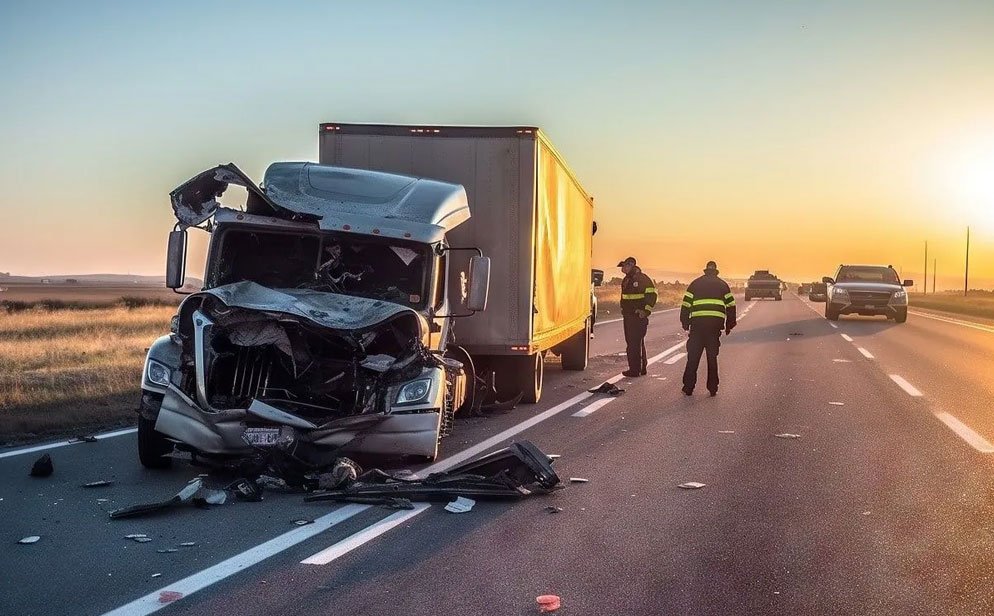Table of Contents
Key Takeaways
- An outline of how negligence affects claims and the nuances of proving liability.
- A guide to navigating the complexities of a truck accident claim’s investigation and settlement process.
- Insight into the types of compensation available and the critical nature of adhering to trucking laws and regulations
Introduction to Truck Accidents and Legal Implications
Truck accidents are among the gravest road hazards, frequently resulting in severe bodily harm and extensive property damage. The resulting legal cases can become mazes of complexity and intricacy looped with strands of evidence, witness statements, and intricate insurance policies. In such challenging moments, the expertise of a well-versed truck crash law firm comes to the fore, offering the required legal guidance to navigate the intricate pathways of truck accident litigation. An adept legal team is paramount to ensure the injured parties receive astute representation and vigorously defend their rights and interests.
Recognizing the Different Parties Involved in a Truck Accident Claim
If you or anyone you know has been in a truck accident, it is crucial to seek the assistance of a dependable truck crash law firm. They can assist you with complex legal procedures and help you obtain the compensation you deserve. Identifying the parties involved in a truck accident claim can be complicated. The collision itself is just the starting point. A truck driver’s mistake could be caused by deeper issues involving the trucking company, the vehicle manufacturer, and various insurance entities, all of which may be responsible to some extent. Each party has its complex policies and legal protections; it is crucial to analyze them carefully to determine where the liabilities lie. It’s not just about who caused the accident but also about the mechanisms that allowed it to happen. This could potentially implicate manufacturers for equipment failure or logistics companies for setting unrealistic delivery schedules.
Immediate Actions Following A Slip and Fall Accident
The chaos immediately following a truck crash is overwhelming. Still, during this period, some of the most critical steps must be taken to protect one’s legal rights. Safety is, of course, the top priority: moving away from traffic and checking for injuries. But once that’s assured, evidence collection should begin at once. Even simple actions like taking photographs of the scene, gathering witness information, or jotting down one’s memories of the event can significantly impact later proceedings. Next, notify the authorities immediately—official reports are potent pieces of corroborating evidence. Finally, ensure that each medical step—from the first examination to the last treatment—is thoroughly documented.
Understanding Trucking Laws and Regulations
The trucking industry operates under an extensive framework of regulations set forth by entities such as the Federal Motor Carrier Safety Administration (FMCSA). These rules cover many areas, from hours-of-service regulations intended to prevent driver fatigue to maintenance requirements ensuring vehicle safety. A working knowledge of these intricate laws is crucial when deciphering the factors contributing to a truck accident. For instance, if a driver has surpassed their legally mandated drive time, and fatigue is a suspected factor, this is directly tied to liability.
The Role of Negligence in Truck Accident Cases
Truck accident claims typically arise from negligence, which means that one party failed to exercise reasonable care to prevent causing harm or loss to another. To prove negligence, the legal team representing the plaintiff must establish that the driver or the company had a duty of care, which resulted in the accident and damages. To win the case, the plaintiff’s legal team must demonstrate that the truck driver or associated parties failed to observe laws or industry standards, which caused harm.
The Complexities of Truck Accident Investigations
A truck accident investigation is a systematic and demanding process requiring the expertise of various professionals. These investigations delve into the minutiae of the event, examining skid marks, vehicle remains, and even the truck’s “black box,” which can uncover critical details such as speed and steering patterns in the moments before a collision. Often, specialized reconstruction experts and mechanical forensic analyzers are brought in to piece together a narrative. Their findings can establish the groundwork for constructing a solid legal case, underpinning arguments for liability and counteracting opposition from powerful insurance companies and corporate legal teams.
Compensation and Damages in Truck Accident Cases
Many jurisdictions also allow punitive damages designed to punish egregious conduct. A truck accident attorney evaluates all aspects of the case, determining an accurate value for the scope of damages. They use a blend of legal acumen and an empathetic understanding of the client’s situation to ensure that any settlement or court award sufficiently addresses the full impact of the incident.
The Settlement Process in Trucking Accident Claims
Most truck accident cases are resolved through settling out of court, which requires an adept balance of negotiation skills and legal strategy mastery. Insurance companies are known for their meticulous risk assessment and often try to settle claims quickly and for the lowest amount possible. Legal counsel is the client’s bulwark in these situations, using the gathered evidence and legal maneuvers to advocate for a settlement that best compensates the victim. It is a delicate push-and-pull process, where understanding the intricacies of liability and the actual monetary and emotional cost to the client can make all the difference between a mediocre and a satisfactory outcome.







